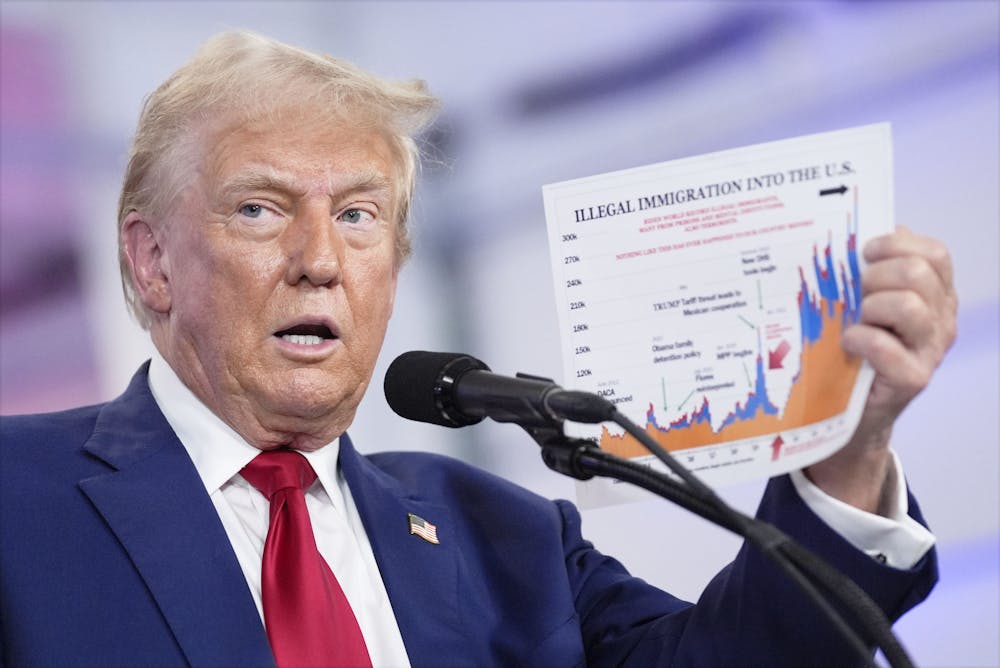Wednesday, April 30, will mark the 100th day of President Donald Trump’s second administration. Since taking office, Trump has unleashed a flurry of executive orders and actions aimed at fulfilling his campaign promises, which have many critics warning of future authoritarianism.
In the past three months, much controversy has arisen over the president’s zealous immigration enforcement policy. During his 2024 campaign, Trump stated his goal to deport millions of undocumented immigrants each year.
He also campaigned on a promise to invoke the Alien Enemies Act of 1798 to detain and deport suspected gang members without due process. On March 15, the president fulfilled this promise through an action aimed at halting the influence of Tren de Aragua, a Venezuelan gang that operates throughout the Americas, including the U.S.
While the Trump administration is far from its goals, deportations since January have been extensive. An update on the Department of Homeland Security website states that Immigration Customs and Enforcement (ICE) officers made over 30,000 arrests in the first 50 days of Trump’s second administration alone.
These numbers were compared to the over 30,000 arrests made throughout the 2024 fiscal year.
Amid ongoing deportation issues, Elon Musk’s Department of Government Efficiency (DOGE) has begun to build a database that compiles data on undocumented immigrants from agencies like the Social Security Administration.
The aim of the new DOGE database is to hasten the deportation process by terminating the Social Security numbers of the undocumented to make them “self deport.”
DOGE’s data-collection efforts have not gone without public protests and legal challenges. Many unions and immigrant-rights groups argue that DOGE violates employee privacy laws.
One incident that has sparked national controversy involves the deportation of Salvadoran immigrant Kilmar Albrego Garcia. Albrego Garcia, who had been living in Maryland for the past 14 years, was deported by the Trump administration under the suspicion that he has ties to the Salvadoran gang MS-13.
Following his deportation to the Terrorism Confinement Center in El Salvador in March, ICE officials recognized that his deportation was an “administrative error.” Despite their acknowledgement of the error, members of the Trump administration maintain that Albrego Garcia is affiliated with MS-13.
U.S. District Judge Paula Xinis, who represents the District of Maryland, ordered Albrego Garcia’s return from El Salvador at the beginning of April. In a 9-0 decision on April 10, the U.S. Supreme Court ruled that the Trump administration must facilitate his return.
The administration has argued that because Albrego Garcia is detained in El Salvador, the responsibility of his return belongs to the Salvadoran government.
Trump has taken issue with the Supreme Court’s decision. On April 21, he made a post on Truth Social stating, “This is the man … that the Courts are trying to save from being deported? He was supposed to be, according to the Judge and the Democrats, a wonderful father from Maryland, but then they noticed he had ‘MS-13’ tattooed onto his knuckles. This is the gang that is, perhaps, the worst of them all.”
According to experts, the knuckle tattoos Trump is referring to are not guaranteed to be associated with MS-13 and may not represent any gang membership at all. Albrego Garcia’s family and lawyers have stated that he has no criminal record or affiliation with any gang.
President Trump’s firm stance on deportations has been influencing public opinion. A Reuters/Ipsos poll conducted on March 21 found that of the over 1,000 polled U.S. adults, nearly 60 percent believe that the president should obey the courts order to stop deportations.
The deportation of Kilmar Albrego Garcia is far from the only legal challenge the Trump administration is facing regarding its immigration enforcement policy.
Milwaukee County Circuit Court Judge Hannah Dugan was arrested by the FBI on Friday, April 25 under the accusation that she had aided a man in evading immigration authorities. She is facing federal charges of obstruction from the Justice Department.
Eduardo Flores Ruiz, the man who Dugan aided, was in her court for a hearing regarding three counts of misdemeanor domestic battery he was being charged with.
In a post on X, FBI Director Kash Patel said, “We believe Judge Dugan intentionally misdirected federal agents away from the subject to be arrested in her courthouse, Eduardo Flores Ruiz, allowing the subject — an illegal alien — to evade arrest.”
Judge Dugan’s arrest has had many Democratic Party leaders arguing that the Trump administration is pushing the U.S. toward authoritarianism.
Sen. Tammy Balwin (D-WI) released a statement on Friday which said, “By relentlessly attacking the judicial system, flouting court orders, and arresting a sitting judge, this President is putting those basic Democratic values that Wisconsinites hold dear on the line.”
“Trump’s latest attack on the judiciary and Judge Dugan is about one thing—unchecked power,” Sen. Bernie Sanders (I-VT) said in a press statement. “Trump continues to demonstrate that he does not believe in the Constitution, the separation of powers or the rule of law. He simply wants more and more power for himself.”





The Slate welcomes thoughtful discussion on all of our stories, but please keep comments civil and on-topic. Read our full guidelines here.